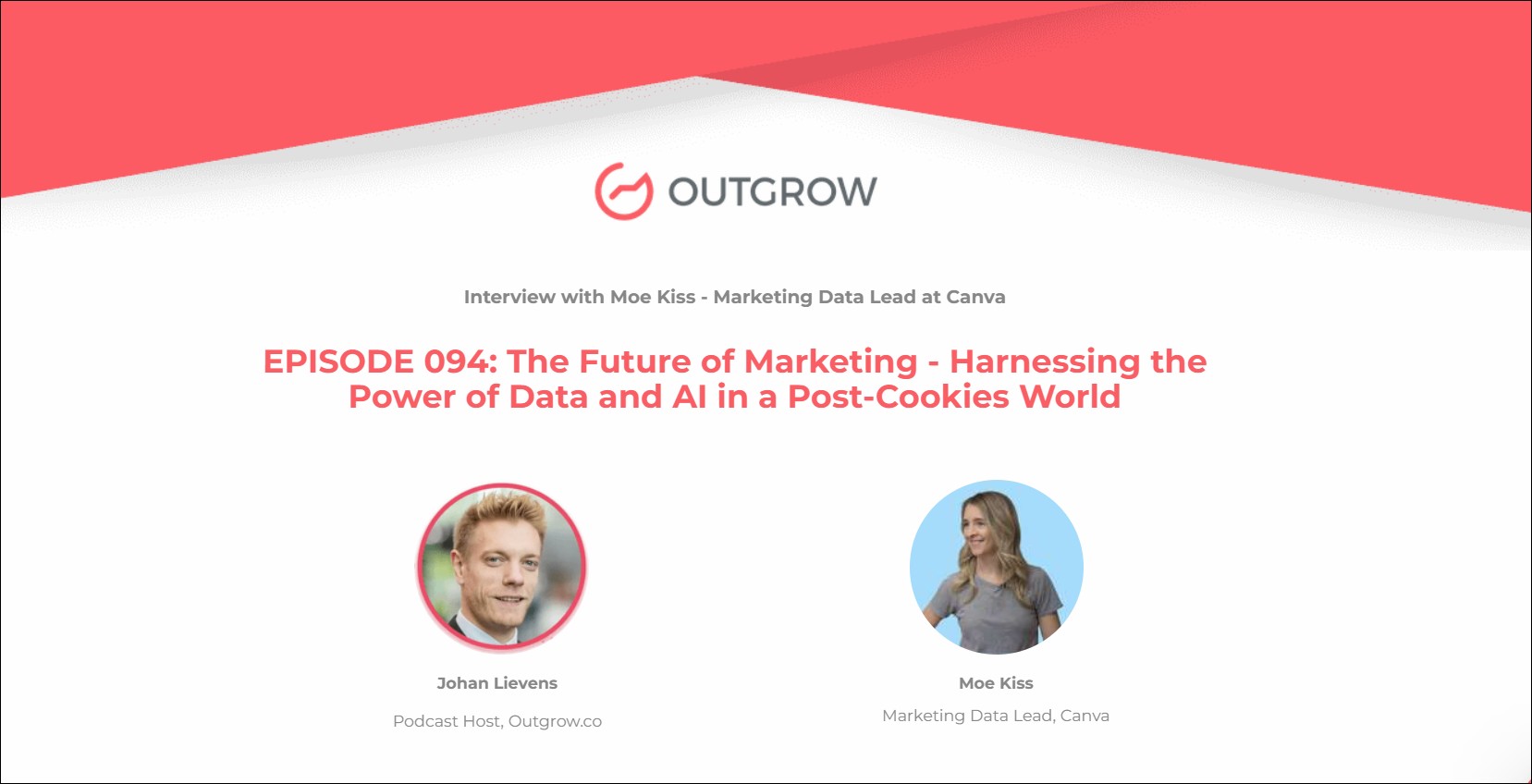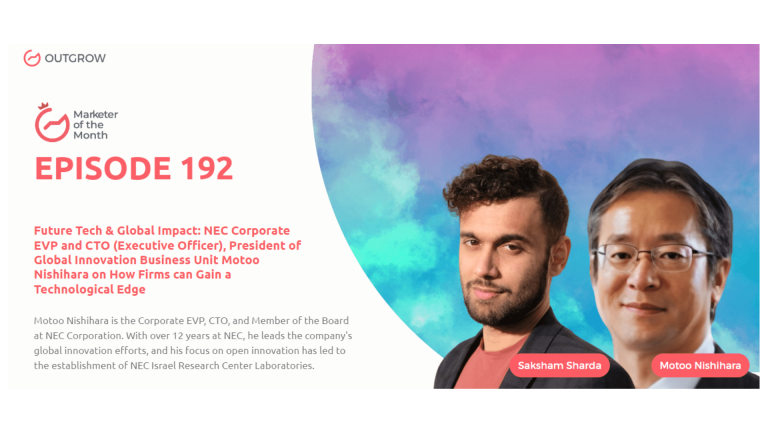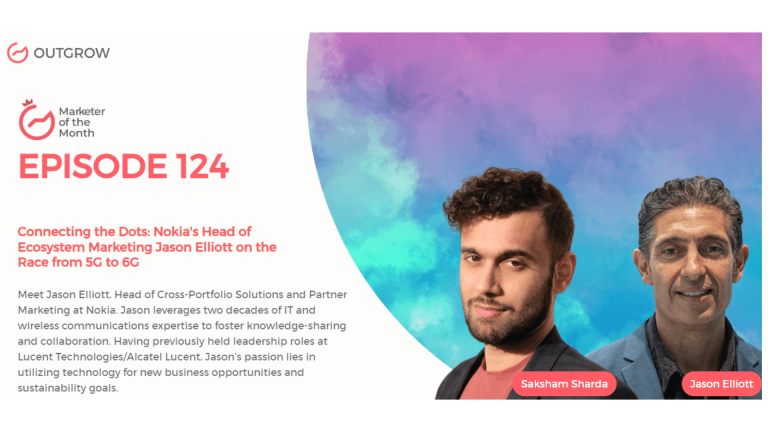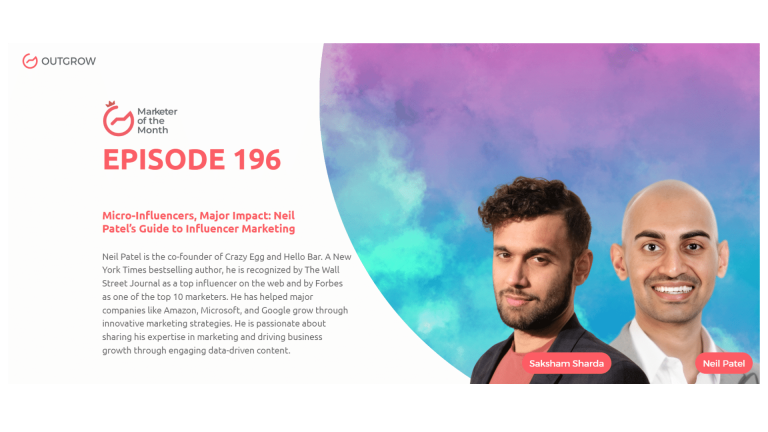Summarize with :
EPISODE 094: Marketer of the Month Podcast with Moe Kiss
Table of Contents
Hey there! Welcome to the Marketer Of The Month blog!
We recently interviewed Moe Kiss for our monthly podcast – ‘Marketer of the Month’! We had some amazing insightful conversations with Moe and here’s what we discussed about –
1. Using AI in marketing for enhancing advertising efforts in the upcoming years
2. Role of GDPR in increasing data quality
3. How the demise of browser cookies has ushered in a Golden Age of digital marketing
4. First Party Data in 2023
5. The difference between being data-driven and data-informed
6. Digital advertising spending in the upcoming year
About our host:
Johan Lievens is the podcasting host at Outgrow.co. He is a Fulbright scholar and a Harvard law grad, with a strong interest in teaching, training, and coaching that emphasizes active learning, empowerment, and group dynamics. He is the winner of VU Amsterdam’s Teacher Talent Award 2020.
About our guest:
Moe is the Marketing Data Lead at Australian unicorn startup, Canva. Prior to that, she worked in top product and marketing analytics roles at THE ICONIC, Australia’s largest online fashion retailer. She specializes in using analytics to understand marketing acquisition and consumer behavior, having worked for both agencies and clients. In 2018, she was named the top new practitioner by the Digital Analytics Association USA.
The Future of Marketing – Harnessing the Power of Data and AI in a Post-Cookie World
The Intro!
Johan Lievens: Hi everyone. Welcome to another episode of Outgrow’s Marketer of the Month. I’m your host, Dr. Johan Lievins. And for this month we’re going to interview Moe Kiss, who is the marketing data lead at Canva. Thanks for joining us, Moe.
Moe Kiss: Happy to be here.
Don’t have time to read? No problem, just watch the Podcast!
Or you can just listen to it on Spotify!
The Rapid Fire Round!
Johan Lievens: So Moe, we’re going to start with a rapid-fire round just to break the ice. You get three passes in case you don’t want to answer the question, you can just say pass. But try to keep your answers to one word or one sentence only, coz it’s a rapid-fire round. Are you ready?
Moe Kiss: Pressure’s on.
Johan Lievens: Yeah. At what age do you want to retire?
Moe Kiss: 65.
Johan Lievens: How long does it take you to get ready in the mornings?
Moe Kiss: 30 minutes now.
Johan Lievens: What’s the most embarrassing moment of your life?
Moe Kiss: I’m gonna pass just because I won’t be able to think of something quickly.
Johan Lievens: First Pass. What’s your favorite color?
Moe Kiss: Blue.
Johan Lievens: What time of day are you most inspired?
Moe Kiss: First thing in the morning, hands down. And having kids destroys that.
Johan Lievens: How many hours of sleep can you survive on? Linked to the kids maybe?
Moe Kiss: Need or survive? Survive, a little like zero to three.
Johan Lievens: Fill in the blank – An upcoming marketing trend is _________.
Moe Kiss: First-party data obsession.
Johan Lievens: The city in which the best kiss of your life happened.
Moe Kiss: Karratha
Johan Lievens: Pick one – Mark Zuckerberg or Jack Dorsey?
Moe Kiss: I’m gonna go with Zuck.
Johan Lievens: The biggest mistake of your career?
Moe Kiss: I don’t believe in mistakes. Just lessons.
Johan Lievens: How do you relax?
Moe Kiss: Cooking.
Johan Lievens: How many cups of coffee do you drink per day?
Moe Kiss: One only.
Johan Lievens: A habit of yours that you hate?
Moe Kiss: Bad at the process.
Johan Lievens: The most valuable skill you’ve learned in life?
Moe Kiss: Communication. Hands down.
Johan Lievens: And then the last one, your favorite Netflix show?
Moe Kiss: At the moment, “The Crown”.
Johan Lievens: Okay. You survived with only one pass.
Moe Kiss: I’m a pretty transparent person, so that makes life easier.
The Big Questions!
Johan Lievens: Yeah. Okay. Wonderful. To get things started, let’s dive into the real questions then. In your opinion, will artificial intelligence in marketing enhance advertising efforts in 2023 and the upcoming years?
Moe Kiss: I think yes, but there are lots of caveats. I work at a company that’s inherently creative and so balancing that need for the actual, like right creative tone and messaging with what AI aka machine learning can achieve is like, it’s a delicate balance between the two, in my opinion. I think the biggest contribution will be in terms of automating manual processes. That’s the non-sexy thing that no one likes to talk about, but it’s really about making marketers more efficient by helping with automation. I think that’s the biggest and most interesting problem for me. But I’m sure other people think of sexier things.
Johan Lievens: Yeah. Could you explain a bit more? How does data deal with AI now? Is it a welcoming thing or is it also a threat to creativity?
Moe Kiss: It depends on who you talk to in marketing. I would say I think some areas see it as a strength. To be honest, I don’t think anyone should see it as a threat. The reality is if you work with data, you know, it’s never gonna take someone’s job away. Because like, particularly once we start talking about like ethics in AI and all those sorts of things you still need humans in the process. Like, this is not about taking people’s jobs away, but it is about making simple things happen automatically so that we can spend our time on more complex problems. This is why I find it so exciting coz even in our team, that’s exactly what we’re trying to do as marketing data practitioners is like, how do we answer simple questions with machine learning so that then we can spend our brain power and energy on the complicated stuff that can’t be solved with a model.
Johan Lievens: Yeah. Okay. Wonderful. Speaking about complex issues do you think that GDPR as a complex issue has increased has led to an increase rather in data quality that it’s kind of an opportunity to delve deeper into the needs of one’s prospects and customers rather than the original, traditional one size fits all marketing approach?
Moe Kiss: Yeah. I’m one of those weird people that get excited about compliance and consent and GDPR and all of those topics, particularly in the marketing space. I think it has been phenomenally good for the industry. And many people probably struggle with this. I was at a marketing conference not too long ago and people were still like, wait, how do we go back to what we had? And it’s like, no, the point is that we can’t go back to what we had. And the reason I think it’s so exciting is that it has forced us to adopt better techniques. And this is particularly in marketing measurements. So my view is that attribution was always a flawed system and with GDPR and changes to cookies and all that sort of stuff it’s just not a technology that works anymore and the reality is, it never completely worked. It was a slightly biased view of the world and there were human decisions that were made. And what has been exciting that my team has been working on in marketing measurement is more about media mix models and in particular geo experiments. So it’s kind of, and this is why I’m still in marketing data because I find the topic so fascinating. It’s forced us to use more sophisticated measurement techniques that are more privacy compliant, but ultimately the actual methodology is stronger. So I like it, I see all of these changes that are happening in the industry as really positive because internally our data practices have gotten stronger as a result.
Johan Lievens: Do you think of examples of startups or of companies that are doing this well, this more complex measurement framework, and how to use it?
Moe Kiss: Yeah, so the funny thing is as we’ve started to talk a lot about what we are doing at Canva in measurements would say there are lots of companies, unfortunately, that still kind of have their head in the sand that are not moving with the times. And I feel for them because I understand why, but it’s just really unfortunate. In chatting to like peers in the industry and stuff, lots of companies aren’t there yet. And we are moving very quickly in the space at Canva. And my read of the market at the moment is that we are ahead of the pack. But the nice thing is that everyone else can then help learn from our mistakes which I’m pretty transparent about when I speak at conferences and that sort of thing, it’s always about like, what lessons have we learned when rolling this out so that other people can benefit from our learnings.
Johan Lievens: Yeah. Is there one specific lesson that comes to mind, like one to share now?
Moe Kiss: One specific lesson is that you need your marketers bought in on it. Like it is, yes, we can have the best methodology in the world, but if they don’t understand fundamentally the approach that we’re taking and why it’s better like they’re not gonna be part of the conversation, right? Like, they’re not even gonna be bought in. You’ll go in that cycle, but the attribution model said this and your numbers are now saying that, and like, there’s a 10% variance and why is that? And like, those conversations are not constructive because you’re measuring things differently. And so the biggest takeaway that I’ve had is like, you want it to be collaborative and the truth of the matter is, I’ve been so fortunate, we work with the most incredible marketers. Everyone is completely obsessed with the concept of incrementality, which is kind of fundamental to this new measurement framework. And yeah, it’s been really exciting, but that’s because we have the marketers bought in. You know, I think if you were fighting to convince them, it would be a much harder job.
Johan Lievens: Yeah. That’s a valuable lesson. Thank you. You already touched upon it very slightly. There’s also the evolution in terms of browser cookies. Do you think the demise of browser cookies has ushered in a golden age of digital marketing, one in which advertisers may forge a new relationship with consumers, build upon trust and an open exchange of value?
Moe Kiss: Yeah, again, I don’t see the deprecation of like third party cookies and, and what not as a particularly bad thing. I am of the school of thought of like, there always should have been valuing for our users, right? And there should be a value exchange of we’re helping make whatever the process is or whatever your experience is better in exchange for the data that you’re giving us. And I love the fact that this direction means that becomes more important and it forces people at companies who may be didn’t care about that stuff to be like, “oh”, I have to care about it”. I know, yeah, from some of the like conversations I’ve been having externally that people are now really starting to focus on first-party data, and some companies are quite panicked about that. I’m fortunate I work in a company that has amazing first-party data and will continue to, so I guess the takeaway for those listening is if you are somewhere that isn’t prioritizing the quality of your first-party data like now is the time to be leaning in and talking to your marketing data folks to make sure that you’re getting support in that area. But yeah, ultimately I think the value exchange has always been there. It’s gonna convince everyone to prioritize it when maybe some people were taking it for granted before.
Johan Lievens: Yeah. You already mentioned it in the quickfire round as well, first-party data is the marketing trend. If this was an award ceremony and you had to convince the audience that it’s the right topic to award the best marketing trend award to what specifically about first-party data is to be applauded?
Moe Kiss: The funny thing is, I don’t think it should be. I think it’s a trend because marketers are concerned about it and particularly companies maybe who aren’t doing it well are starting to like panic a little bit. For me, I think the most exciting trend is to do with clean rooms and the measurement stuff that I mentioned before, but I don’t wanna harp on about that again. I think the concept of clean rooms and how we still achieve our marketing objectives while making sure that like data is depersonalized and we’re not sharing things with companies that we don’t need to like, I think is the most exciting thing and that should be getting the award.
Johan Lievens: Yeah. Okay. For our listeners, could you maybe by talking about how Canva uses both concepts, how is Canva using clean rooms, how Canva uses first-party data, and explain a bit more about what these concepts mean to Canva?
Moe Kiss: Yeah, so clean, like full transparency, clean room. Projects are just starting to kick off, like Google and Meta both have their versions of those products that don’t quote me on it cause I can’t remember which ones exactly are in beta. So we’re in the very early stages of that. And that’s why I say it’s like the trend of 2023 is because it’s gonna be what everyone’s focusing on and a big part of our team is gonna be working on that integration as well. When it comes to first-party data I would say it’s more about ensuring quality data and like really solid model builds to make sure that you’re not capturing everything under the sign, you’re capturing the stuff that you need to, and that it’s well modeled so that you can use it for reporting purposes instead of perhaps relying on third-party marketing tools to tell you if you’re doing a good job at marketing, you should be able to leverage what you have in-house.
Johan Lievens: Yeah. Maybe that touches upon my next question, which would be, what is in your opinion, the difference between being data-driven and data-informed in 2023? Is that difference in the same direction?
Moe Kiss: Yeah, this is a real stupor. To be honest, I don’t even know what the term data-driven means, and that’s my confusion as someone that works in the data industry. Like I feel it’s a term that gets used a lot and so many people have different interpretations of what it means, and what it doesn’t mean. It’s, it’s quite loaded. I think I would probably just take a step back and instead, when I look at our organization, I like the word is data fueling decisions? Like to me, that’s the goal, right? Like, are we using our findings about marketing data to affect change in the business? And I think that’s probably more important because yeah, like data-driven or data-informed, they just are so politically loaded and I don’t think people even know, well I don’t know what they mean anymore. Maybe you should tell me.
Johan Lievens: Yeah, no, but you replace it with data-fueled.
Moe Kiss: Yeah, I think it sounds a bit sexier too, doesn’t it?
Johan Lievens: Yeah, it does. Okay, let’s move on. What is your opinion on ad spending in 2023? Do you anticipate a rise in digital advertising spending in the upcoming year?
Moe Kiss: What a stupor. So I think there are a lot of forces at play in the market right now. And my expectation is not necessarily that coz like there are lots of big tech companies that are going through some pretty difficult situations in terms of like layoffs or restructures and stock prices declining. So I don’t think that we’re gonna see a huge increase, especially in digital spending. What I think most people are gonna be focused on, and this is certainly what I’m focused on, is how we improve the measurement of our spending to ensure that every dollar we spend is being spent in the most efficient way possible. And to me that’s exciting cause I think that’s how we should be focused instead of, it’s not about I guess the overall budget it’s about the budget that we have spent in the smartest way possible. And for 2023, I know internally we’re using a much more test-and-learn approach of unlocking spend versus like an assumption that we often make at the start of the year or we’re gonna spend x amount on this channel and that channel we’re moving to more of an experimental model of let’s try this particular tactic or technique or campaign or channel or whatever it is for some time. Let’s set up a proper experimentation framework and if we prove, if we can prove that money is efficiently spent, then let’s double down on it and let’s reinvest or let’s try that in another market, or that sort of thing. And so actually making sure that the decisions we do make about our ad spend are based on learnings and not gut.
Johan Lievens: Yeah. Do you see other companies or startups that inspire you in this?
Moe Kiss: In terms of their measurement approach?
Johan Lievens: Yeah. In terms of their smart approach to ad spending in a way?
Moe Kiss: To be honest, I don’t have exposure to other companies’ ad spending to know, but I would love anyone to hit me up on Twitter if they have been, if they see companies that they find particularly inspiring the space, I would love to come up with a bit of like a dossier on who’s doing it well so that we can learn from them.
Johan Lievens: Yeah, because it seems like Canva is doing well. How does Canva position itself as a relatively new player in this debate of ad spending?
Moe Kiss: I think generally, and this is like a very broad statement, but we tend to focus on running our race. You know, like we wanna empower the world to design and that’s our mission. There isn’t so much focus on, you know, what another company’s doing or what another company’s spending is. It’s really about what are our long-term objectives and how we make sure that we’re investing in the right places to achieve those objectives.
Johan Lievens: Yeah. Okay. Wonderful. We’re already at our last question and it’s a bit of a personal kind. But what would you be doing in your life, if not this?
Moe Kiss: What would I be doing in my life? You know, the funny thing is I am a person who grew up moving around a lot and I truly believe that you can live anywhere and be happy. I also have been through, if anyone does look at my LinkedIn, I have had some very weird jobs that will make sense to no one. I used to work in youth justice in the criminal justice system. I used to work in like policy for our federal government and people kind of look at me and they’re like, how did you end up in data? And it makes complete sense. If you sit me down with a glass of wine, I can explain how that transition happened. I think you can be happy in any career also as long as you can find the bits that you are passionate about. And so, for example, what I do in marketing data, I’m really passionate about learning and constantly like evolving my knowledge on a particular topic. I’m passionate about the team that I lead and coach and their professional development. I care about giving back to the data community because the data community helped me so phenomenally when I was transitioning into the industry. So for me, it’s not about like, is there another specific job I would be doing? It’s that I think you can find happiness in any career as long as there are some components of those things that matter to you. And so for me, it would be like what would I be doing that involved, you know sharing my learnings, my self continuing to learn and like really developing other people and their skills and, and helping them uncover what their superpowers are. And I feel like there are so many jobs in the world where I could probably find that.
Johan Lievens: If not data, then anything else that thrives your passion.
Moe Kiss: Yeah, pretty much.
Let’s Conclude!
Johan Lievens: Okay. Thank you. Thanks, everyone for joining us for this month’s episode of Outgrow’s marketer of the month. That was Moe Kiss. Thanks for joining us, Moe. Check out their Twitter for more details and we’ll see you once again next month with another marketer of the month.









